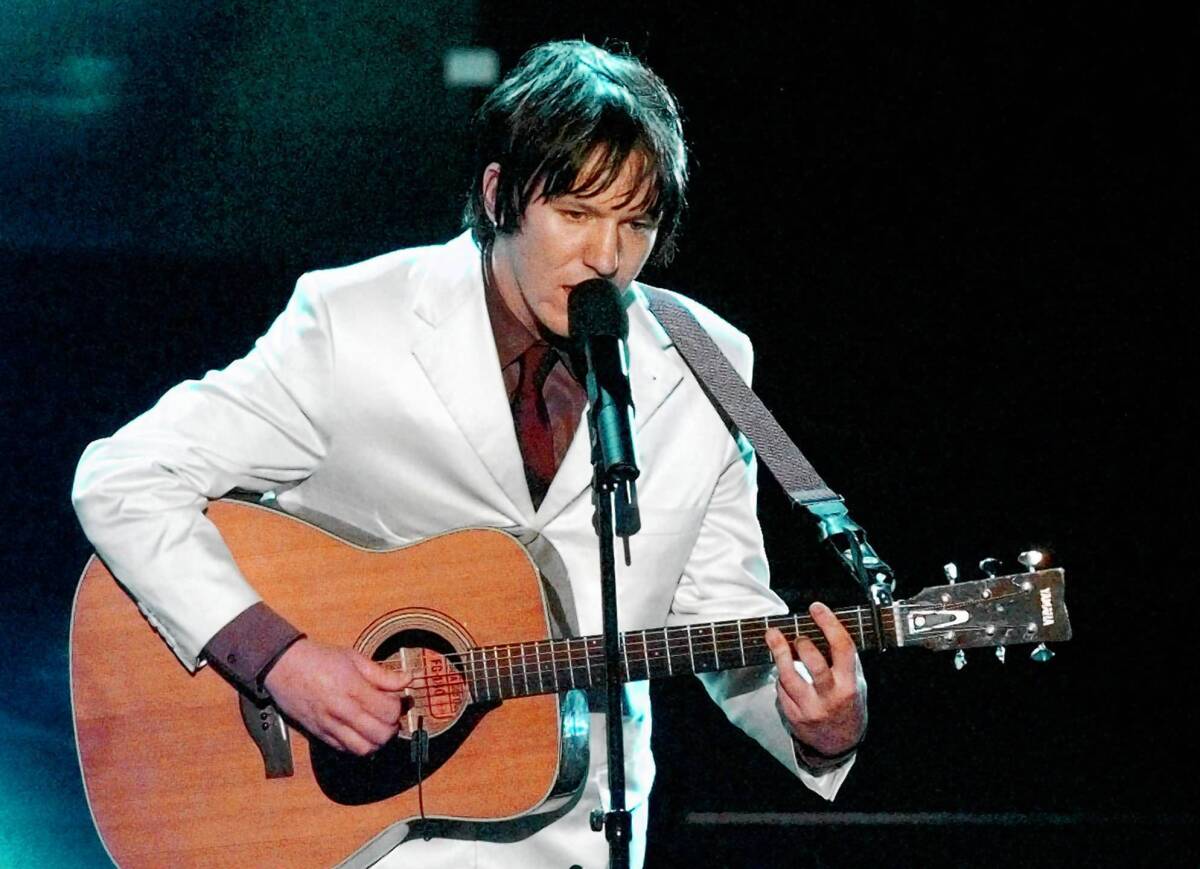Elliott Smith comforts, saddens 10 years after his death

Elliott Smith needed a cigarette. The singer-songwriter was onstage at Largo on Fairfax Avenue not long after smoking had been banned in California bars.
“He’d played about 10 songs and said, ‘I’m going to go take a smoke break, does anyone want to join me?’” remembered Largo’s longtime owner Mark Flanagan of the 1998 show. “He put his guitar down and walked out to the street. Then 60 people got up and gathered outside. People who didn’t even smoke were smoking outside just to be near him.”
Smith died 10 years ago this week in his Echo Park home. Those who want to be close to the artist now gather in another public spot — the impromptu Elliott Smith memorial wall just outside the Solutions speaker repair shop on Sunset Boulevard in Silver Lake. Smith was photographed there for his “Figure 8” album cover; these days messages, candles and tiny bottles of Jameson Irish Whiskey (a favorite drink of Smith’s) are left there in his memory.
PHOTOS: Celebrities by The Times
“10/21/13 Elliott, thanks for all you have shared with me, and thousands of others like me,” wrote one visitor before quoting his song “Waltz #2 (XO).” “I’m never gonna know you now, but I’m gonna love you anyhow. XO, Rachel.”
Police initially suspected the 34-year-old committed suicide after finding his body with two knife wounds to his heart, but a formal autopsy report was inconclusive. Today, there are still questions surrounding his death.
But more than his violent end, it’s his intricate, heart-rending songs that are his legacy, and secure his place as much more than another L.A. rock tragedy.
“He had this melancholy where you just wanted to take care of him,” Flanagan said. “His songs made you say ‘My God, I’m on his side.’”
In a pop age of blinding dance music, lascivious club-rap and top-40-ready indie rock, Smith’s intimate folk songs are still passed among young lovers like talismans. For those who knew him, the anniversary is, as he sang on his 2004 posthumous album “From a Basement on the Hill,” a bittersweet occasion for “a fond farewell to a friend.”
A new book by William Todd Schultz, “Torment Saint,” leads a small coterie of devoted Smith biographies. Fan-run sites like Sweet Adeline still direct new audiences to live bootlegs, unreleased covers and Smith ephemera that add up to one of the most heartfelt catalogs in the modern singer-songwriter tradition.
In August, his longtime collaborator and producer Jon Brion, director Gus Van Sant and others organized a four-city series of shows celebrating what would have been Smith’s 44th birthday.
RELATED: Best albums of 2013 so far | Randall Roberts
Born in Nebraska and raised in Texas, Smith was one of the unlikeliest indie-rock stars to break into the pop sphere. In 1994, just three years after Nirvana’s “Nevermind” brought the scruffy, noisy sounds of the Pacific Northwest into the national limelight, Smith released his debut “Roman Candle.” His acoustic-driven solo records, like 1997’s lauded “Either/Or,” were antithetical to his heavy indie peers at the time.
But just a year later, he was performing alongside Hollywood belters Celine Dion and Trisha Yearwood at the 1998 Academy Awards. His quiet, desperate “Miss Misery,” part of Van Sant’s “Good Will Hunting” soundtrack, had been nominated for an Oscar.
“That was crazier than Nirvana selling 10 million records,” said Slim Moon, the founder of the indie label Kill Rock Stars who signed Smith in the 1990s. “I knew Kurt Cobain and this was even weirder. It was like your friend going to meet the queen. I just don’t know how he ever got past those gatekeepers. No huge corporation stood to benefit from him being there.”
Before clean-scrubbed indie-pop acts like Arcade Fire and Bon Iver won top Grammy categories, there was Smith, standing alone in a loose white suit, stringy brown hair in his eyes, playing before the biggest television audience in entertainment. He was the night’s most commanding performer.
“He practiced 12 hours a day and his playing was so understated and really difficult. He was just so good,” said producer Rob Schnapf, who worked with Smith on his final four albums. “I remember one show at this club called Brownies, and it was just full of New York hipsters and he hadn’t won any of them over yet. But after he got on and started playing, you could just hear a pin drop. After that, everything was different.”
INTERACTIVE: A festival for every fan – SoCal’s yearly sonic lineup
“Elliott stood out,” said Rhett Miller, frontman of the Old 97’s. “That inexplicable quality Elliott’s voice had, vulnerable and evocative, always had him at the front of the pack.”
Modest and shy by disposition, Smith was drawn to the nonchalance and collaborative streak at Largo. It was a scene that nurtured Fiona Apple and Beck. For a songwriter whose name is practically synonymous with lonely misery, he could let other sides of his personality out in that environment. “He was really dry but goofy,” Flanagan said.
Though he grappled with longtime drug addiction, Smith was reportedly clean at the time of his death.
The autopsy report for Steven Paul Smith, the singer’s birth name, is still a harrowing document.
“While his history of depression is compatible with suicide, and the location and direction of the stab wounds are consistent with self-infliction, several aspects … are atypical of suicide and raise the possibility of homicide,” deputy medical examiner Lisa Scheinin wrote in 2004. She concluded, “the mode [of death] will remain undetermined until such time as sufficient additional information becomes available.”
Smith’s last words appeared to be a Post-It note found at the scene: “I’m so sorry-love, Elliott God forgive me.”
“I don’t really listen to his records that often anymore,” said Schnapf, his onetime producer. “I don’t like where I end up after I put them on.”
But fans still search for Elliott Smith.
“Go to YouTube and find his solo live shows,” Moon said. “Watch his body language, watch his technique and all his subtleties and his Gen-X slacker thing. You’ll feel it.”
More to Read
The biggest entertainment stories
Get our big stories about Hollywood, film, television, music, arts, culture and more right in your inbox as soon as they publish.
You may occasionally receive promotional content from the Los Angeles Times.











